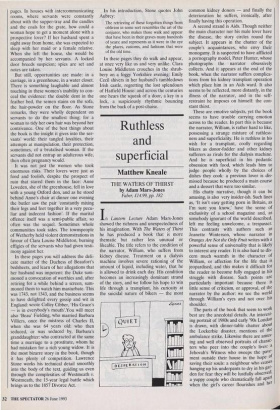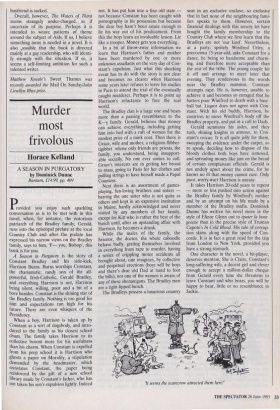Ruthless and superficial
Matthew Kneale
THE WATERS OF THIRST by Adam Mars-Jones Faber, £14.99, pp. 182 In Lantern Lecture Adam Mars-Jones showed the richness and unexpectedness of his imagination. With The Waters of Thirst he has produced a book that is more thematic but rather less unusual or likeable. The title refers to the condition of the narrator, William, who suffers from kidney disease. Treatment on a dialysis machine involves severe rationing of the amount of liquid, including water, that he is allowed to drink each day. His condition becomes an increasingly dominant strand of the story, and we follow his hope to win life through a transplant, his curiosity at the suicidal nature of bikers — the most
common kidney donors — and finally the deterioration he suffers, ironically, after finally having this operation.
A second strand is Aids. Though neither the main character nor his male lover have the disease, the story circles round the subject. It appears in the chatter of the couple's acquaintances, who envy their monogamy. It is suspected to have afflicted a pornography model, Peter Hunter, whose photographs the narrator obsessively collects. And it appears at the end of the book, when the narrator suffers complica- tions from his kidney transplant operation which place him in an Aids ward. It also seems to be reflected, more distantly, in the illness of the narrator, and in the self- restraint he imposes on himself: the con- stant thirst.
These are emotive subjects, yet the book seems to have trouble carrying emotion across to the reader. In part this is because the narrator, William, is rather hard to like, possessing a strange mixture of ruthless- ness and superficiality. He is ruthless in his wish for a transplant, coolly regarding bikers as donor-fodder and other kidney sufferers as rivals for the dialysis machine. And he is superficial in his pedantic obsession with food, which leads him to judge people wholly by the choices of dishes they cook: a previous lover is dis- missed because he produced a main course and a dessert that were too similar.
His chatty narrative, though it can be amusing, is also very insider-ish. Such lines as, 'It isn't easy getting porn in Britain, as I'm sure you know,' have the sense of exclusivity of a school magazine and, as somebody ignorant of the world described, left me feeling unwelcome, a trespasser. This contrasts with authors such as Jeanette Winterson, whose narrator in Oranges Are Not the Only Fruit writes with a powerful sense of universality that is likely to interest any reader. It is also hard to dis- cern much warmth in the character of William, or affection for the life that is jeopardised, and this makes it difficult for the reader to become fully engaged in his struggle with disease. Such points are particularly important because there is little sense of criticism, or approval, of the narrator by the author: we see the world through William's eyes and not over his shoulder.
The parts of the book that seem to work best are the anecdotal details. An interest- ing portrait of 1980s and early '90s London is drawn, with dinner-table chatter about the Lockerbie disaster, mentions of the ambulance strike. Likewise there are amus- ing and well observed portraits of charac- ters who peer into the couple's lives: a Jehovah's Witness who sweeps the pave- ment outside their house in the hope 01 saving their souls: a neighbour who ceases hanging up his underpants to dry in his gar- den for fear they will be lustfully observed, a yuppy couple who dramatically fall apart when the girl's career flourishes and her
boyfriend is sacked.
Overall, however, The Waters of Thirst seems strangely under-charged, as if uncertain of its purpose. Perhaps it is intended to weave patterns of theme around the subject of Aids. If so, I believe something more is needed in a novel. It is also possible that the book is directed mainly at a gay readership, who will identi- fy strongly with the situation. If so, it seems a self-limiting ambition for such a talented writer.
Matthew Kneale's Sweet Thames was recently awarded the Mail On Sunday/John Llewllyn Rhys prize.



























































 Previous page
Previous page